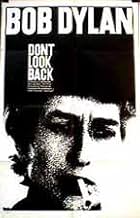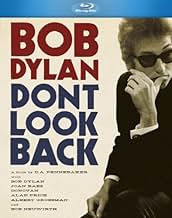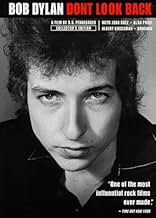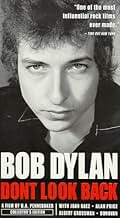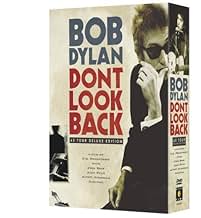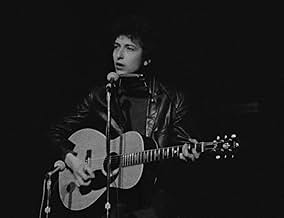Montre la tournée de Bob Dylan en Angleterre en 1965, avec des apparitions de Joan Baez et de Donovan.Montre la tournée de Bob Dylan en Angleterre en 1965, avec des apparitions de Joan Baez et de Donovan.Montre la tournée de Bob Dylan en Angleterre en 1965, avec des apparitions de Joan Baez et de Donovan.
- Réalisation
- Scénario
- Casting principal
- Récompenses
- 4 victoires au total
- Self
- (non crédité)
- Self - science student
- (non crédité)
- Self
- (non crédité)
- Self
- (non crédité)
- Self
- (non crédité)
- Self
- (non crédité)
Avis à la une
It's hard to know how to take Bob Dylan in this documentary. Many of the interviews shown are ones given on the fly just before he goes on stage, and a certain amount of pre-show jitters and nervous reaction is probably to be expected. I would not want to interview a musician just before they are set to perform on strange stages in a foreign country. His interviews come across as a person who has been doing way too much of what we, in fact, see Bob doing all through the film, reading his own press clippings and being very impressed with what he finds. He comes across as a person who thinks he understands all, but is too deep to be understood in turn. So deep, in fact, that mere mortal reporters are not even worth taking the time to explain things to. He wastes the reporter's and the film audience's time playing verbal games, quibbling over choics of words in questions and in general coming across as far more self-important than he really is. This can be seen as anti-establishment, it can also be seen as being a plain old pain in the butt just because you can, to entertain your buddies.
Donovan is there, and is a presence from the start of the film. Bob is very aware of him, has been told that Donovan plays better than he does. Donovan was the British version of Bob and, at times, sold better than Bob did. They finally meet and trade songs, Bob sarcastically choosing to sing "It's All Over Now, Baby Blue" right at Donovan. Joan Baez is there for a portion of the movie, beautiful and ignored by Bob and his entourage. Albert Grossman comes across as a bull in a China shop in England where the genteel older gentlemen who still handled promotion were absolutely no match for Grossman's New York tough guy ways. We see him on the phones, milking every last dollar he can from promoters.
Highly recommended documentary. For what it is worth, besides his music, this is about as close as anyone ever got to Bob Dylan. The film makers were wise in not asking any questions or directing anything, but just in letting Bob talk.
a term used to describe films that looked as if they were happening in real time. This is one of those films. It is a gritty black and white documentary that follows the legendary Bob Dylan during a tour in England. This is not a conventional rock documentary where we are shown endless concert footage and interviews with musicians talking about their philosophies and the meanings of their songs. Instead, the camera follows Dylan in a frenzy capturing every detail of social interaction with his fans, entourage, and the press. Dylan appears arrogant but it is no surprise when Pennebaker allows us to see the hypocrisy and greed of the outside world. A memorable moment in the film involves a fan whose invited himself backstage to meet Bob Dylan. He asks him absurd questions such as "what is your attitude on life?" Dylan decides to tease him and the conversation gets pretty ugly. Nevertheless, it is an important scene to the film because it shows us how difficult it is for a superstar such a Dylan to keep a smile and act nice to everyone. Do we gain sympathy for Dylan? We do because we see how alienated he feels among even his closest friends. We also feel a sense of envy for his ability to be so unapologetic and rebellious about his attitude. He is honest but he also has to protect himself from the public. After a Time magazine reporter asks him whether or not he cares what he's saying . Dylan attacks him and then tries to give him a straight answer . "Do you think anyone who comes to these concerts is looking for anything other then entertainment?" The next day, Dylan hears a quote from the papers that describes him as an anarchist. The sequence of these events show clearly how Dylan is at a loss with the public's perception of him. He can't just be himself. He wants to come across as a guy like anyone else but his sarcastic and meaningless interaction with the press only makes things worse. The film also includes appearances with Joan Baez, Donovan, Allen Ginsberg, and Dylan's sleazy manager Albert Grossman. I've seen this film dozens of times and I still see something new with every viewing. It is a true masterpiece.
Right from the start you can tell Dylan is sick of being on tour, either that ir he's sick of people(note how he rolls his eyes in the very beginning when he explains to a woman why he's carrying a lightbulb) so we become accustomed to the way he answers questions; sometimes rude but always originally, many times hilariously. He was afterall, still a very young guy in a foreign country. It didn't matter how he spoke with people, though, because he communicated enough-as we can see in Don't Look Back through his music.
When you watch him play, it's amazing to see the stillness in the audience, the entranced eyes, fixed in concentration, minds in fear that they may miss a word of one of Dylan's songs. I love how, right at the beginning when he gets asked "When did you know you wanted to become a performer?" and he seems to think for a minute...and it cuts to: Dylan about 6-8 years prior..playing in a field surrounded by a bunch of African Americans...seemingly singing about (an)African-American...and when the camera pans close to his face, you can see tears rolling down his cheeks! It made me cry...........
The good thing about it is you see a little bit of everything...Dylan on stage in his element, Dylan f*ked up;), w/his pals, p***ed off, and Englanders...
We also get to see a very young Joan Baez( whose voice I had never even heard before watching this)- an innocent, beautiful woman who despite this had morals and a voice that would also be heard....like Dylan she was way ahead of her time.
In short, I cannot say enough about this documentary-it gets better everytime I see it, and I don't say that about a lot. I still cannot hear enough of his music or his lyrics...
Long live Dylan and Baez... -Heidi
In other words, this is not a portrait of the artist that I happen to like, but it is the truth (or at least it was at that time). In addition, Albert Grossman, Dylan's manager, is shown in possibly the least flattering light possible. A bonus is that the film begins with the brilliant 1965 promotional clip for "Subterranean Homesick Blues", and watch for the scene in a hotel room when Dylan and Bob Neuwirth sing "Lost Highway" - it's worth the price of admission.
Le saviez-vous
- AnecdotesThe scene where Donovan visits Dylan in his hotel was generally viewed as Dylan putting the young singer-songwriter in his place when he grabs the guitar and performs "It's All Over Now, Baby Blue." But a 2015 Criterion Collection remaster, with improved sound, revealed that Donovan actually requested Dylan play that song for him. That gave the entire scene a new meaning and revealed Dylan and Donovan as more friends than rivals.
- Citations
Albert Grossman: They've started calling you an anarchist.
Bob Dylan: Who?
Albert Grossman: The papers. That's the word now.
Bob Dylan: Anarchist?
Albert Grossman: Right. Yeah.
Bob Dylan: The newspaper's say I'm an anarchist?
Albert Grossman: Two or three. Just because you don't offer any solutions.
Bob Dylan: You're kidding!
Albert Grossman: Of course.
Bob Dylan: Anarchist? Huh? Give me a cigarette. Give the anarchist a cigarette. Anarchist? A singer such as I.
- ConnexionsFeatured in Precious Images (1986)
Meilleurs choix
- How long is Bob Dylan: Dont Look Back?Alimenté par Alexa
Détails
Box-office
- Montant brut mondial
- 934 $US
- Durée
- 1h 36min(96 min)
- Couleur
- Mixage
- Rapport de forme
- 1.37 : 1


